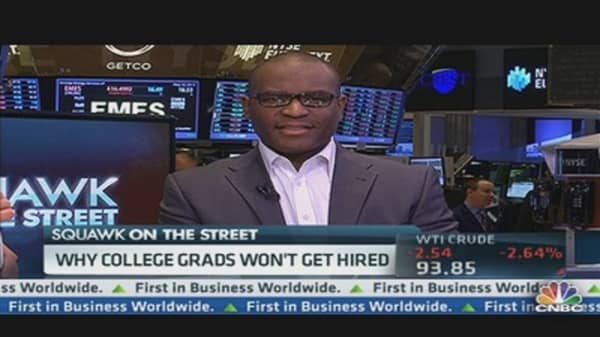After watching older students go through the turmoil of the recession, Heiss said he doesn't take for granted that he will have a way to pay off approximately $30,000 in student loan debt.
"I'll say this: I've never felt more grateful to have a job," he said.
The good news for the college class of 2013 is that the job market seems to be gradually improving. Students like Heiss report that more recruiters have returned to campus, and the national unemployment rate is ticking back down.
The bad news for young workers is that competition remains extremely tough. The unemployment rate for 20- to 24-year-olds was 13.1 percent in April, far higher than the overall unemployment rate of 7.5 percent.
Experts say a college degree should at least give the class of 2013 an edge over peers who didn't go to college. A Pew Charitable Trusts analysis of government data through 2011 found that 21- to 24-year-olds with a college degree saw smaller drops in employment and wages than their peers with less education.
But even when some college seniors land a job, it's not their dream gig.
Elizabeth Phan knows how fortunate she is to have a well-paying sales job with an upscale retailer. But Phan, 22, would be happy to be earning half of what she does now if she could snag a career-track job in the financial industry.
Even when she applies for entry-level positions, Phan said she finds herself competing against people who are much more experienced but also are desperate for work.
"I have been looking for a while and it is getting quite frustrating, but I know I'm not the only one so that's helping," she said.
Phan will graduate this month from the Fashion Institute of Technology, part of the State University of New York, with a degree in international trade and marketing.
She started her college career in 2008 at a much pricier private school, but the financial crisis made her question whether the approximately $40,000 cost was worth it.
She left that school, moved to New York City, started at community college and eventually earned her degree at FIT. She'd like to get a master's degree, but she doesn't want the student loan debt.
"I refuse to take it on," she said.
Simeon Bochev also might have taken a different college path if it weren't for the recession.
When the housing market was hot, Bochev's mother had invested in a vacation property in Colorado, figuring that she'd use the profits for his college education. Instead, the housing bust wiped out much of the home's value just as Bochev was due to start school.
At the time, Bochev was deciding between University of Texas at Austin and George Washington University in Washington, D.C.
The stark difference in costs made it easy to decide to go to Austin to study engineering. But even with lower tuition costs, it was a struggle. He worked as a resident assistant and took paid internships. To help, his mother lived paycheck to paycheck.
Bochev, who immigrated with his parents to the United States from Bulgaria when he was just a baby, said his lifelong dream is to be the U.S. ambassador to Bulgaria. He figures that if he had gone to George Washington, he would have done political internships and ended up with a government or think tank job.
Instead, he got a bachelor's degree in engineering and then took on $18,500 in student loan debt to finance a yearlong graduate program in finance. He'll graduate this month and has accepted a job with a major consulting firm.
Bochev also has committed to starting his Master's in Business Administration at Harvard in 2017. He said he hopes the MBA will provide a transition into public policy, putting him back on track to that ambassador job he had set his sights on.
"I don't think I gave up the dream," he said. "I just took a longer way around to it."




